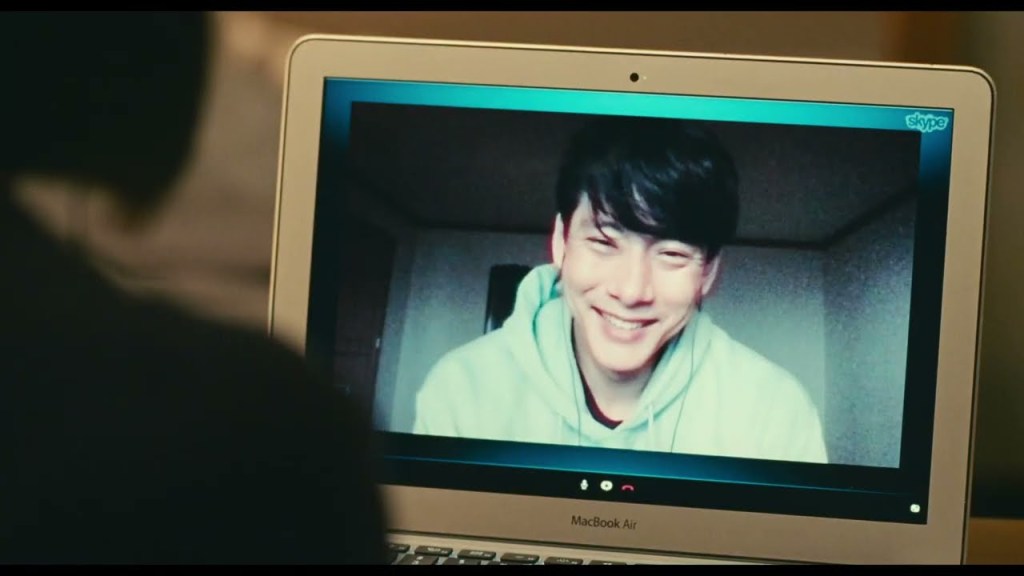Fifteen seconds into this movie, I strongly suspected that the film was somewhat autobiographical, that very much like My Big Fat Greek Wedding, the writer was able to take a fairly specific situation and build a film that not just portrays that situation, but also says something much more universal. Oddly enough, in both films, a clash of cultures is an integral part of the drama, but whereas My Big Fat Greek Wedding is a comedy, Past Lives is a drama, and a tear-jerker at that.
The film starts out in South Korea, probably in the late 1990s, in the days before everybody was quite so connected on the internet. We meet two children, both 12, Na Young and Hae Sung. Na Young is both very competitive and emotional, whereas Hae Sung, while probably as smart as she is, is stoic, compassionate, and easygoing. The personalities of the two seem to compliment each other perfectly, and a deep bond of friendship – and even love – develops between the two.

Unfortunately, Na Young’s parents have decided to emigrate to Canada. Na Young seems to have convinced herself, at the very least, that this will be good for her career as a writer – after all, she declares, they don’t give Nobel Prizes in Literature to Koreans.
In Canada, Na Young becomes Nora, and over the course of the next dozen years or so, she buckles down to overcome the culture shock, to master English, and to get herself into the best programs that she can manage, which is how, twelve years later, she’s living in New York City, really at the cusp of much of that hard work paying off in the form of writing opportunities and work and the like.
Now, however, everybody’s got the internet, and on a whim, she looks up her old friend Hae Sung. She’s shocked to find that he’s been looking for her and they rekindle online what is, at the very least, a very deep friendship.

And then… Well, I don’t want to give too much of the story away, but – life happens. It’s easy to make Nora out to be fairly heartless in the next turn of events, but the more I think about it, while I don’t think she was right in her method, what she was probably for the best. It’s certainly up for debate.
Another twelve years pass, and while life has been pretty good for Nora – though she has toned down her Nobel dream – it hasn’t been quite so wonderful for Hae Sung. It isn’t that it’s necessarily been bad, but without the pure ambition Nora has, he’s really gotten stuck in a fairly prospectless “ordinary”. After breaking up with his long-time girlfriend, he decides that he’s going to visit New York, and though Nora is married, he’d like to see her again. It’s as though some part of him will always be hers.
This visit is where a lot of the “high drama” stems from. It’s not necessarily a love triangle, but while Nora is absolutely devoted to her non-Korean husband and their life in New York, there’s still that love and history between her and Hae Sung that is precious and palpable – some part of her also belongs to him. I’m not necessarily convinced by the explanation given about this in the film, but the characters themselves are doing the best that they can to understand the situation, so I can be forgiving of a less than perfect answer. Mind you, the movie never calls the relationship between Nora and Hae Sung “love”, but I don’t know if it can be understood any other way.
The movie is fairly slow-paced, and about two-thirds of it is in Korean with subtitles. Interesting, too, is that the woman who played Nora as an adult was coached to speak Korean in a way that one would in her situation; fluent, but having lost the manner with which it’s spoken in Korea as well small mistakes and such which come simply from not using it most of the time. I don’t speak Korean, I don’t know firsthand, but there’s clues in the movie, too, such as when the two of them are communicating in their 20s, she seems to be having some small troubles remembering spelling or how to type something…
I appreciated a lot that this was a movie that had no sex scenes, there may have been a small amount of adult language, but it was generally kept to a minimum. Listening to the commentary on My Big Fat Greek Wedding years ago, Nia Vardelos commented that in the one scene, the director wanted her to show more skin, and she retorted, “Are you kidding me? My mom is going to watch this! My priest is going to watch this!” I kind of got the same feeling here, that the film was cut to be something more acceptable to a Korean taste, and I think it elevates the film. Normally, I enjoy watching the deleted scenes, but a couple of them here are crass, and I’m quite glad they were cut, as I think in the long run, it does nothing to advance the story.
None of the characters are necessarily angels, but I appreciated that all three of the main characters were very sympathetic, and one could even say good people. There’s a moment during the visit where Hae Sung says something to the effect of he didn’t know it would hurt so bad that he liked Arthur (Nora’s husband) so much. They are the actions and feelings of mature human beings, not storybook fiction. There’s also a strange tension knowing that Nora and Hae Sung are now adults and not angels but at the same time, there’s a sweet innocence between the two of them that stems from childhood; especially in the case of Hae Sung, as much as he might desire Nora, he’s also bound to do right by her because she is so precious to him.

This film was recommended to me by a friend of mine who told me I had to see it. I’d never heard of the film, but already by the description, I was intrigued. There’s a line in the song “Killing Me Softly With His Song” that goes “I felt he found my letters and read each one out loud”. That was very much the feeling I had watching this movie. Some of the detail were extraordinary, and especially every time Skype rang or there was a bad connection or there was some miscalculation of time zones or what-have-you, I was kind of pulled back to times when I was doing the same sort of thing.
So much of what Hollywood would have everyone believe about relationships and love is so solidly centered around sex and power that it seems that there’s no room to even entertain the notion that other types of relationships exist. Those attitudes get picked up by a lot of people, even some who are quite well-meaning. The end result is the world growing a little “colder” (to borrow from “Hey Jude”). We need to be people who love others not because of sex, power, or desiring to get something out of it, but because love is the glue that holds people together. Christians are commanded to love each other simply in order to demonstrate that they are Christians. To see a movie that explores even a little bit of those other types of love is rare, and this film pulls it off spectacularly, portraying not just the things that are beautiful about it, but the vulnerability and heartbreak that is inherent even to any love.
If any of you have seen this movie, I’d love to hear your impressions; there are a couple of aspects I didn’t touch on here because I thought it might give too much away, but might be good for discussion down in the comments! 🙂
